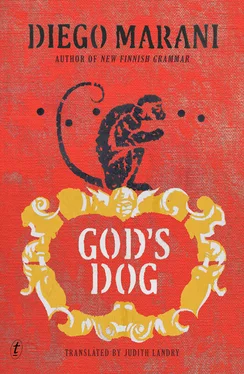He watched them as they met up, emerging from porches and alleyways. There were four of them; at first he thought they were just passers-by, people coming out to smoke a cigarette. One had a dog on a lead; another was taking a lighter out of his pocket. Salazar began to run, but the four men behind him were on his trail. Incredible though it seemed, at that hour the streets around Campo Marzio were all empty. Coming to a place where the street widened out, he tried to hide behind some parked cars, but his pursuers were on his trail. They dragged him out and stood him up in front of a street door, opened up their jackets and brought out their guns. Salazar lifted his hands slowly above his head and let himself be disarmed. He tried to look them in the eye, to memorise their faces; before he could do so, he felt a sharp stab of pain in the nape of his neck and lost consciousness.
The Vicar felt a macabre relish in slipping it into his mouth before placing it in his eye socket. That slippery sphere gave him a dizzy sense of power. He could eat the eye he had not got. He imagined himself swallowing his organ of sight and seeing inside himself, he who could not see outside himself. What effect would that have? He spat his prosthesis out into his hand, put it in the empty ashtray and took two little bottles out of a drawer. He sprinkled the lubricant on to the silicone eye and put it in, then washed out his mouth with the strawberry-scented mouthwash. Now he was whole again. He put the bottles back into the drawer and opened the envelope on the table. He took a black exercise-book out of it and started to read Salazar’s diary, which his agents had just brought to him from Amsterdam.
24 April
First I should say how I first met Guntur, who he is, what he does. But I’m in such a hurry to tell the story of Django that I don’t know where to start: thoughts are piling up in my head and the words are getting all tangled up on the page. This whole business is a bombshell, indeed it may even portend the death of the Church as we know it. But it’s better that no one in Rome should hear about it; they would overreact, as usual, and only make things worse. Until I’ve thought of some way out, I’ll keep it to myself. Guntur is older than me by some ten years, but he seems very young; his face too is strangely youthful, he’s got no spare flesh on his frame, he is self-disciplined and unassuming. His high cheek-bones and narrow eyes add a touch of mystery. He survived the tsunami which struck Indonesia in 2004 and, like me, he grew up in an orphanage, run by a Dutch Muslim charitable body. He likes to say that only orphans can be good Muslims, because the Prophet was an orphan too. Normal people, who grow up in a family, don’t know what it means not to be able to call any woman mother, nor any man father. Guntur is a neuro-psychiatrist, he is doing research at the University of Amsterdam and in his spare time he helps out in a madrassa in Slotervaart. We first met a couple of months ago, and immediately clicked; we’re both survivors, after all. We both regard our existence as a joke played by providence, and this helps us not to become attached to people, or to things, and to realise that one day we will lose everything. Guntur is a scientist, but he is also a sincere believer. His is the science of Avicenna, that is, a science which proves the existence of God and uses faith to cast light on reason. Guntur had agreed to talk about the Gospels in the madrassa, and it was with him that I organised the first Biblical-Koranist groups. I have set the missionary priests they send me from Rome to praying along with the imams; that way, they will be more useful than saying mass for a handful of senile old women in the church of Sint Nicolaas. Let’s hope that the people in Rome won’t be too quick to notice what’s going on. There is a lot at stake for me. I should have sought protection in the curia before embarking on such a risky venture. Anyway, it’s too late now. Perhaps there is still someone in Bologna who knows me, some fellow student from the Patriarchal Monastery. I should make a visit sometime. But I’m so happy here. This year spring has been particularly lovely in Amsterdam, with the sky a constantly changing shade of blue, and the wind bringing a smell of earth, tearing the clouds into a thousand tatters the moment they form. The canals seem deeper, and below the surface another city teems with life, a city of fish on bicycles. In the evening it often rains, but it’s like fine spray, light as a watering hose, prolonging the lives of the tulips and keeping the grass green. Guntur and I often meet up in a coffee shop on the Oudezijds. We talk about philosophy and faith, helped along by a pipeful of good Himalaya Cream.
28 April
This morning we woke up to thick mist, which is unusual at this time of year. I could tell it was misty because of the bicycle bells: when it’s misty, they sound as though they’re ringing underwater. The mist didn’t rise until midday, but even then the sun didn’t come out. And I had various irritating problems: that business with the money raised its head again. I had to go to the bank to explain. Rome sends me too much at a time, and I can’t invest it all immediately; money laundering takes time. I can’t start buying diamonds! I’ve tried to explain things to the Papal Nuncio, and he always promises that he’ll talk it over with the Secretary of State. Meanwhile, I’m in danger of being accused of money laundering by the Dutch Customs Service. If they think I’m going to start going all over Europe with suitcases full of banknotes, they’ll have to think again! They’ll have to take on a mafioso to do that for them. I don’t understand their strategy here either. If we must engage in money laundering, let’s do it properly. With a good investment plan we’d run fewer risks and do better business. For example, how about them setting me up with a nice slush fund! It works like that here too. Why not pay some newspaper to write what we want, instead of insisting that we sell our own, which no one reads? Or why not invest in marine insurance, or armaments or container ships? That would mean sure-fire profit and less snooping. I keep on sending reports to Rome with details from firms which are up for sale, but I might as well not bother.
2 May
Today Guntur took me to his madrassa again. Some of the old men still mutter when they see the crucifix in my lapel, but they all hear me out, and when I read the psalms, some of them recite them with me. It is clear that we are all praying to the same God. Guntur pointed out that the Koran almost always speaks of believers, very rarely of Muslims, and in his view this is proof that Mohammed’s first followers made no distinction between themselves and the Christians or Jews. They felt that they were all part of the one single faith; the real difference was with the others, the pagans and above all the atheists. The Slotervaart Muslims are well-organised. They have their own schools, which are better than those run by the state, their own social security system, their own doctors. They send their children to Arab universities, but then have them come back here. Holland is their country, and Muslims are in the majority in the cities; only the provinces are Protestant, though there are still a few Catholics in the south. The people in Rome would like me to spend time among them, to go to Maastricht to distribute catechisms in the schools; they fail to understand the game that is being played around these parts.
8 May
Sometimes I am puzzled by Guntur’s attitude to science, and I think that even in his own world he is regarded as an oddity. For Muslims the only aim of science is to explain, to transmit, never to query or investigate. Guntur on the other hand has no qualms about discovering things which might put God’s truth in doubt, indeed he maintains that one should never hesitate to follow the path along which doubt leads us. Yesterday evening in the Coffee Shop we had a disagreement. My view was that scientific discoveries are our own miracles: they are inexplicable, they can lead only to further wonderment. However far man may push himself, even in tinkering with life itself, the result will never be his own creation; at most, it will be mere rejigging. But Guntur disagreed.
Читать дальше












